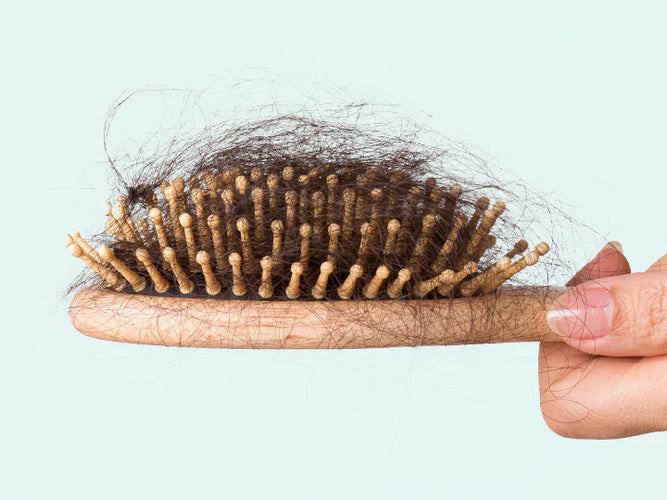Alopecia totalis is a rare form of hair loss in which all the hair on the scalp disappears. The condition belongs to the same group as alopecia areata, where the immune system attacks the hair follicles. This can happen suddenly or gradually. The course varies from person to person: in some cases, the hair grows back partially, while in others, it remains absent for a longer time.
What is Alopecia Totalis?
Alopecia totalis is a rare autoimmune condition that causes complete hair loss on the scalp. Unlike ordinary alopecia areata, which is characterised by one or several bald patches, this form leads to total scalp hair loss. Eyebrows and eyelashes often remain intact, although they can also fall out in some cases.
The condition can occur at any age but most often appears before the age of forty and frequently develops from a previous form of alopecia areata. When hair loss extends across the entire body, it is known as alopecia universalis. Because the immune system attacks the hair follicles, hair growth temporarily or completely stops.
What triggers this type of hair loss?
The exact cause of alopecia totalis is still not fully understood. Researchers do know that it is an autoimmune reaction, meaning that the immune system mistakenly attacks the hair follicles and interrupts hair growth.
Certain factors may influence the onset or progression of the condition:
- Genetic predisposition: if alopecia occurs in the family, the likelihood of developing it is slightly higher.
- Stress: prolonged stress can disrupt the immune system and act as a trigger.
- Infections or viruses: some people notice hair loss after an illness, although this link has not been scientifically proven.
- Hormonal changes: such as during puberty or menopause, which may act as an additional factor.
It is important to note that there is no evidence that diet or hair products cause alopecia totalis.
Symptoms of Alopecia Totalis
Alopecia totalis often develops from alopecia areata. It usually begins with one or more round bald patches on the scalp that gradually expand until all scalp hair is lost. This usually happens without pain or inflammation, although some people experience mild itching or tingling on the scalp.
Possible signs include:
- Rapid or gradual loss of nearly all hair on the scalp,
- Changes to the nails, such as ridges or brittleness (though not in all cases),
- A tingling sensation or mild itching shortly before the hair falls out.
If you recognise these symptoms, it is advisable to consult your general practitioner. They can examine whether it is alopecia totalis and provide information about possible treatments or next steps.
Is alopecia totalis temporary or permanent?
The progression of alopecia totalis varies greatly from person to person. In some cases, the hair partially or completely grows back, while in others, it remains absent for a long time or permanently.
In general, the longer the hair remains absent, the smaller the chance of full recovery. However, predicting the outcome is difficult, as the condition behaves differently in each individual.
Alopecia totalis can sometimes develop rapidly after the first bald spots of alopecia areata, occasionally within a few months. Hair regrowth is slightly more common in children than in adults, but even then, the course is uncertain.
There is therefore no definitive answer as to whether alopecia totalis is temporary or permanent.
Treatment of alopecia totalis: what are the options?
Unfortunately, there is no treatment that can cure alopecia totalis or that works for everyone. However, several medical approaches are sometimes tried. Because these are medical treatments, it is important to seek advice from a doctor or dermatologist. There are also ways to care for the scalp and cope with hair loss:
Cosmetic support
There are nourishing products that help improve the condition of the scalp. They may contribute to a healthy environment for hair growth but do not replace medical treatment.
Hairpieces and wigs
Many people choose a wig or hairpiece as a practical and confidence-boosting solution. Today, there are natural, comfortable, and stylish options available.
General self-care
A healthy lifestyle, adequate rest, and reducing stress can support overall wellbeing. This does not directly affect the condition itself but can help you feel better emotionally and physically.
The emotional impact of alopecia totalis
Alopecia totalis affects more than just the body; it can also have a significant emotional impact. Losing your hair changes your appearance and can trigger feelings of insecurity, sadness, or shame. Many people find they need to rediscover how to accept themselves. This takes time, but you do not have to go through this process alone.
Tips to strengthen your mental wellbeing
- Connect with others who share similar experiences through forums or social media. Sharing your story can be comforting.
- Speak with a psychologist or coach if you feel emotionally stuck.
- Wear whatever feels most comfortable for you, whether that is going bald, using a hat, headscarf, or wig.
- Focus on what you can do and who you are. Your hair does not define your worth.
- Give yourself time to find your path. There is no right or wrong way, every journey is unique.
Frequently asked questions about alopecia totalis
Is a hair transplant possible?
Usually not. In alopecia totalis, hair falls out because the immune system attacks the follicles. This means that transplanted hair is also likely to fall out again. For this reason, hair transplantation is rarely performed in people with this condition. Only a doctor can assess whether it might be an option in exceptional cases.
Is alopecia totalis contagious?
No, alopecia totalis is not contagious. The condition develops because the immune system attacks the body’s own hair follicles, not due to a virus or bacteria. You cannot catch it from someone or pass it on to others. It is completely safe to touch or share items, such as towels or pillows, with someone who has alopecia totalis.
Conclusion
Alopecia totalis is a rare autoimmune condition that causes complete hair loss on the scalp. Its cause is not yet fully understood, and the course varies from person to person. Although there is no treatment that can cure the condition, there are medical options you can discuss with a doctor, as well as cosmetic ways to care for the scalp and manage hair loss. Coping with alopecia totalis often requires time and resilience, both physically and emotionally. Support from professionals, peers, and loved ones can help you regain confidence in who you are, with or without hair.
Sources
National Center for Biotechnology Information (NCBI)
This information does not replace professional medical advice. If in doubt, always consult a doctor or specialist.













